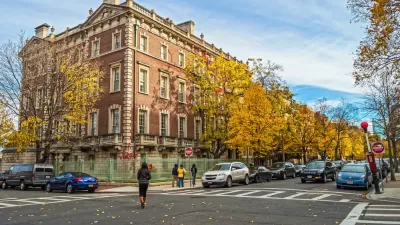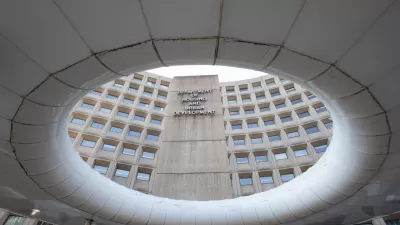The Affirmatively Furthering Fair Housing rule is back, but with one critical change that seems to respond to complaints used by Trump administration officials to rescind the rule in 2020.

Tracy Jan reports:
Nearly a year after the Trump administration replaced an Obama-era fair housing rule that critics decried as “burdensome” and that President Donald Trump alleged would “abolish” suburbs, President Biden’s housing department is restoring the requirement that communities take steps to reduce racial segregation or risk losing federal funds.
The Biden administration proposed the rule change back in April.
The reinstated Affirmatively Furthering Fair Housing (AFFH) rule will have significant differences from the original version crafted by the Obama administration. A mandate that "communities undergo an extensive analysis of local barriers to integration and submit plans to dismantle them to the Department of Housing and Urban Development" has been nixed, explains Tran. The Biden administration justified the change by describing the assessment requirement as "unnecessarily burdensome," echoing former HUD Secretary Ben Carson's criticism of the AFFH.
Jonathan Zasloff—who has criticized the AFFH as implemented by the Obama administration as ineffective in an article for Planetizen in August 2020—is quoted in the article criticizing the Biden administration's changes to the AFFH rule.
“This doesn’t reverse the damage of the Trump administration,” said Jonathan Zasloff, a professor who teaches housing discrimination at UCLA School of Law. “The entire point of the 2015 rule was to have a standard data set. What gets measured gets dealt with.”
According to the article, local jurisdictions "must still maintain records of the actions they are taking to promote fair housing, even if they are not required to submit them."

Alabama: Trump Terminates Settlements for Black Communities Harmed By Raw Sewage
Trump deemed the landmark civil rights agreement “illegal DEI and environmental justice policy.”

Planetizen Federal Action Tracker
A weekly monitor of how Trump’s orders and actions are impacting planners and planning in America.

Why Should We Subsidize Public Transportation?
Many public transit agencies face financial stress due to rising costs, declining fare revenue, and declining subsidies. Transit advocates must provide a strong business case for increasing public transit funding.

Understanding Road Diets
An explainer from Momentum highlights the advantages of reducing vehicle lanes in favor of more bike, transit, and pedestrian infrastructure.

New California Law Regulates Warehouse Pollution
A new law tightens building and emissions regulations for large distribution warehouses to mitigate air pollution and traffic in surrounding communities.

Phoenix Announces Opening Date for Light Rail Extension
The South Central extension will connect South Phoenix to downtown and other major hubs starting on June 7.
Urban Design for Planners 1: Software Tools
This six-course series explores essential urban design concepts using open source software and equips planners with the tools they need to participate fully in the urban design process.
Planning for Universal Design
Learn the tools for implementing Universal Design in planning regulations.
Caltrans
Smith Gee Studio
Institute for Housing and Urban Development Studies (IHS)
City of Grandview
Harvard GSD Executive Education
Toledo-Lucas County Plan Commissions
Salt Lake City
NYU Wagner Graduate School of Public Service





























